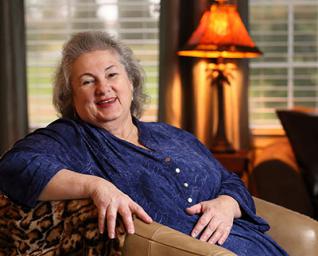 Barbara Engler hasn’t been the same since falling off her horse onto a stone wall when she was 14. Then compression fractures in her spine that resulted from a car accident, paired with arthritis, meant living with back pain of varying degrees for decades. She tried different procedures in the past with little success, and she didn’t want to rely on pain medications for relief.
Barbara Engler hasn’t been the same since falling off her horse onto a stone wall when she was 14. Then compression fractures in her spine that resulted from a car accident, paired with arthritis, meant living with back pain of varying degrees for decades. She tried different procedures in the past with little success, and she didn’t want to rely on pain medications for relief.
“I can take a lot, but at times the pain was so sharp it would drop me to my knees,” says Barbara, a 70-year-old Jackson resident who once trained and showed horses. “It was getting harder to take care of basic things like getting groceries, and I was beginning to wonder how I was going to manage.”
In her ongoing quest for a solution, a physician referred her to Maged Ghattas, MD, a board-certified pain management and palliative medicine specialist on staff at CentraState. After careful review of Barbara’s situation, Dr. Ghattas suggested a procedure called radiofrequency ablation.
Deactivating Nerves that Deliver Pain
Radiofrequency ablation uses radiofrequency energy to target and deaden the nerves delivering pain signals caused by arthritis in the spinal column. A technology that is administered using a needle, the outpatient procedure is performed at CentraState’s Donna O’Donnell, RN Medical Arts Building in under an hour. CentraState is one of only a handful of hospitals in the region to offer cooled radiofrequency ablation, a more specialized form of radiofrequency ablation in which only the tip of the needle is heated around the nerve. This approach generates more heat at the precise location of the nerve.
“Both traditional and cooled radiofrequency ablation can provide excellent results in patients with arthritis of the spine and other degenerative joint and spine conditions, such as neck, low back, and knee pain,” explains Dr. Ghattas. “Patients have the ability to build core strength once their pain is minimized, so they can delay the arthritic process and improve their quality of life.”
Barbara had three courses of radiofrequency ablation, which includes “test drives” to numb the nerve before deactivating it. This assesses preliminary pain relief to ensure that the right nerve is isolated.
“I couldn’t believe the comfort I felt, even after the preliminary procedure,” says Barbara. “I’m so thankful that finally someone could find the answers I needed while explaining every step of the process.”
Barbara can now safely babysit and play with her young grandson. She intends to provide a dog with a good home for the first time in more than a decade. She also hopes to take a cross-country flight to California soon to visit her siblings—all things that previously were impossible due to the pain.
“I find myself amazed at how I feel, because I don’t really have memories of feeling good after so many years of simply coping,” Barbara adds. “Now, it’s different. I have a future.”
For more information about CentraState’s pain relief services, call 866-CENTRA7 (866-236-8727).





